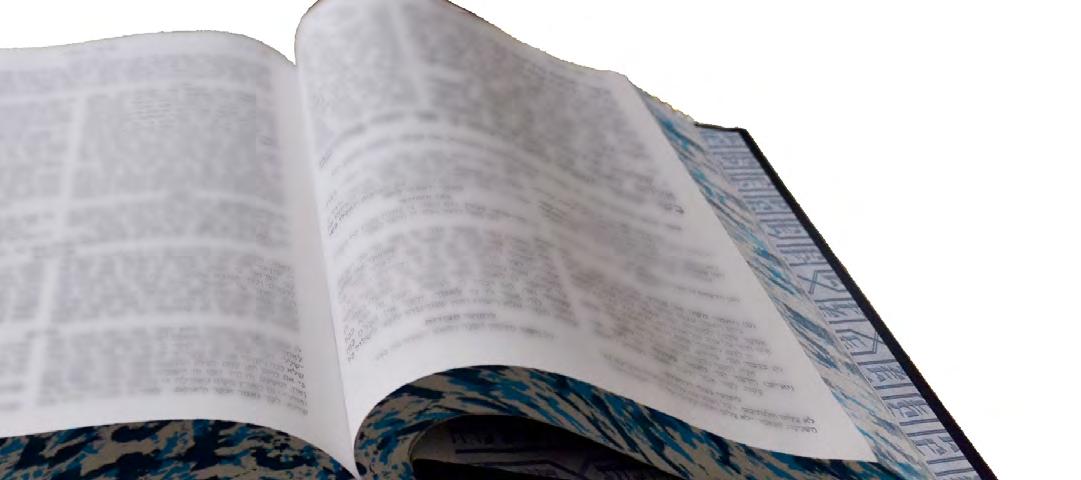
9 minute read
Rabbi Zvi Teichman
Torah Thought For Love Is as Fierce as Death
By Rabbi Zvi Teichman
Advertisement
Praiseworthy is the man who has made Hashem his trust, and not turned to the arrogant and to strayers after falsehood. (ה מ םילהת)
The Midrash states that the first half of this verse refers to none other than Yosef, who placed absolute faith in G-d. Yet, the Midrash also says that the admonition in the second half — not to rely in human instruments of power, also alludes to Yosef who lapsed in his trust of G-d by requesting of the chief wine steward to remember to intercede on his behalf. Yosef was destined because of this flaw, to be imprisoned for an additional two years
Was Yosef’s hishtadlus — lobbying on his own behalf a lack of faith? Was he expected to rely on miracles alone in being saved from the dungeon?
There is a fascinating law associated with the reciting of Al HaNisim on Chanukah.
If one forgets to insert it during the second blessing of Birkas HaMazon, although one need not repeat the entire bentching, one should add it in the series of HaRachamans that are recited at the end, but prefacing it with the following addition:
Repair and/or replace: Hot Water Tanks • Sump Pumps • Faucets • Toilets • Garbage Disposals • Instant Hots • Dish Washers • Dryers • Washing Machines • Light Fixtures • Switches • Dimmers • Outside Lighting • Fans • Timers • and more...
Licensed • Bonded • Insured
410-929-2802
The compassionate One! May He
perform for us miracles and wonders
It appears that we are asking of G-d to ‘break the laws of nature’ to bring us our needs. But the Talmud clearly states that one may not pray for G-d to perform miracles, citing the example of praying for a female fetus to transform into a male, or vice versa. (ס תוכרב.)
The Holy Reb Levi Yitzchok of Berditchev has a remarkable teaching on the concept of וסינב ריכמ סנה לעב ןיא — the recipient of a miracle does not recognize his miracle, referring to the notion that the beneficiary of G-d’s miraculous interventions is often oblivious to it.
The great teacher reveals that there is more than what meets the eye in this simple expression.
The statement above is not merely an observation, but a requirement to be deserving of miracles.
To be a recipient of a miracle one must embed within his psyche that there is absolutely no difference whether G-d maintains calm seas or splits them. It is never about the miracle because either way is totally within His control. It is more about His wondrous love for us that has no limitations as He will do whatever it takes to provide for his cherished ones. One who sees no distinction nor reacts with wonder when experiencing the miracle itself but is moved solely by the love and devotion G-d bestows on him, is the one who will experience whatever it takes — even miracles if necessary — precisely because he pays no special tribute to the wondrous miracle per se, but more significantly to the constant care and attention G-d pays to him.
Reb Levi Yitzchok goes on to offer a marvelous interpretation of the verse in Tehillim, Let them give thanks to Hashem for His kindness, and His wonders to the children of man. (ח זק םיליהת)
Let them give thanks to Hashem for His דסח/ kindness — marvel not over the ‘miracles’ he does, but over the exhibition of His boundless loving kindness, and His wonders to the children of man — for this is the true wonder, how much He loves His children.
He then interprets the verse ארונ תוליהת — too awesome for praise, השע אלפ — Doer of wonders. (אי וט תומש)
ארונ, he suggests implies more accurately fear, a fear of being able to assess G-d’s praise adequately when describing miracles. Can one possibly comprehend the true nature of this power, one minute the laws of nature dictate one set of rules, and then suddenly there appears to be a totally contradictory reality, both provided by the same entity?
The only thing we can appreciate, is G-d’s endless devotion and love for us.
The Rebbe of Toldos Aharon observes that we pray for miracles ‘as he performed it for our forefathers’. They sensed the love from Hashem that never let them pause from that awareness. They knew it mattered not whether we experienced a miraculous intervention, it was the thrill in the
FIT A BIT OF TORAH INTO YOUR LIFE. L TO JOIN... TOGETHERTO EARN, TO ASPIRE , TO CON N ECT
PERFECT FOR THE ACTIVE JEWISH ADULT WHO IS SEARCHING FOR SPIRITUAL KNOWLEDGE AND GROWTH. BIT BY BIT.
Become a mentor ma k e a difference in someone's l i f eCHANGE A LIFE
GOAL:
Torah Together will provide you with a carefully selected Torah mentor for an hour a week of Study & discussion. One-on-one learning in a group setting allows for building a connection with one’s mentor as well with others in the program.
ACTIVITY:
Learning takes place in the welcoming atmosphere of Shomrei Emunah. Wednesdays | 8:00 PM | No Charge
Refreshments are served Women welcome. Men! Make your own schedule!
STEPS:
Choose the Topic of your choice.
We can offer suggestions to help you choose a subject you’ll enjoy. Call Toby Friedman, Program Director 443.468.4598 Meet your partner at Torah Together.



Torah Thought
wonder of His devotion that prodded our praise. In that type of relationship G-d would provide whatever was necessary.
If we cease from marveling over the miracle and begin to excite our consciousness in the reality of His love, we may then ask for whatever we want, since it makes no difference.
One who attains this level of bond will not only never expect miracles but will even be able to accept the difficulties of life that may come one’s way. Aren’t they all dispensed by the most marvelous Father whose love knows no bounds?
ב) Hashem was with Yosef (טל תישארב
Yosef attained an extraordinary relationship with G-d, living with a heightened consciousness of G-d’s devotion to him, which was the only reason he was able to withstand the most difficult circumstances, yet remain enthused by G-d’s presence.
It was Yosef’s instinct to lobby for his release that still required more honing, that led to an additional twoyear stint in prison. One on the level of Yosef would eventually come to rely completely on his faith in G-d to provide without any need to ‘assist’.
The last one of the Thirteen Attributes of Mercy is that of הקנו — And Who cleanses, G-d removes the effect of the sin for those who repent. The very next two words in the verse is אלו הקני — but does not cleanse completely for those who have not fully repented. This second sentiment seemingly associated with the attribute of ןיד — judgment.
The Holy Arizal points out that these two words הקנו and הקני both consist of the letters קנ bordered by the letters ק-ו-ק-י, the Name of Compassion.
Ruby Lasker Designs
Flower Join the Delivery Club
• Free delivery every Friday • Starting at just $25/week Shelly’s Blossom Shop 410.961.4199
The double קנ-קנ spells out in reverse ןקנק alluding to a pitcher, the pitcher that we refer to in the piyut Maoz Tzur when we say םינקנק רתונמו — and from the one remnant of the flasks, a miracle was wrought.
This mystically alludes to the ‘two pitchers’ of mercy and that of judgment, both defined and dispensed with utmost compassion.
For the one who fathoms this idea of ‘Let them give thanks to Hashem for His kindness’ will never complain and only praise no matter what may come one’s way.
Daily life in the ghetto was focused on striving to simply survive one day to the next.
Yaakov, a fearless and courageous young man, tried to assist his fellow Jews from perishing under the cruel conditions. One day as he strode out on his daily rounds, his young daughter reminded him that it was Erev Chanukah and begged her father to find some candles so they would be able to light the Menorah. He promised her he would.
Food and other sundry items were scarce to say the least. Yaakov spent the better part of the day scrounging around to locate a store that had eight candles for the duration of Chanukah. He finally, by the end of the day, succeeded in procuring eight candles.
The streets were quiet as he returned quickly home, only to be spotted by a group of sadistic Nazi soldiers who grabbed every able-bodied passerby. They commanded the crew to march in step to the front of the courthouse, instructing them to line up there in a single file, side by side. The first in line was told to lift a heavy rock and toss it onto the feet of the one standing adjacent to him. The next one, although bruised and bloodied, was to follow suit and bend down to lift the rock and then toss it onto the foot of the next in line. this went on for several rounds. On one of Yaakov’s turns as he bent over to raise the rock once again, the candles in his pocket fell to the floor. He tried to kick it quickly and unobtrusively to the side, but the German soldier spotted it.
The Nazi accused him of intending to use the large number of candles to signal the enemy at night.
Yaakov denied it, explaining how there are eight nights of Chanukah, a Jewish holiday the Jews celebrate starting that night.
The Nazi sneered at him derisively screaming, “Eight candles? Chanukah!? I will provide you candles all right!”
He then grabbed the Jew forcibly dipping his eight extended fingers into tar and kerosene, and then ignited them with a match. “Here, you now have eight lit candles to celebrate your holiday of lights!”, the inhumane creature bellowed mockingly.
At first the excruciating pain of his burning fingers nearly caused Yaakov to pass out. But something stirred deeply within him, rejuvenating him with strength as he began running through the streets shouting “Chanukah! Chanukah!” for all to see. He called out “my daughter, my child, I have returned to you with the Chanukah licht as I promised you I would.
People gazed from their shuttered windows viewing the brilliant light that illuminated a world, whispering quietly to themselves as tears streamed from their eyes, “HaNeiros hallalu kodesh heim — these lights lit upon a Menorah — a neshama carved from solid gold, are indeed so sacred and inspiring!”
May we always brim over in praise for the privilege of being in Hashem’s loving embrace, even when times are tough, and most certainly when we have so much to be thankful for.
May He perform for us miracles and wonders as He performed for our forefathers in those days, at this time!











